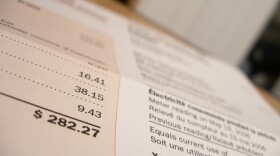Congresswoman Rashida Tlaib plans to introduce a bill on Friday that would offer forgivable loans to people who have fallen behind on utility payments during the pandemic.
The measure put forth by the Detroit-area Congresswoman would allocate nearly 40 billion in federal funding to go towards debt owed on electricity, gas, water, and internet bills across the country, although Tlaib said she was moved to author the bill by her constituents.
"I saw firsthand many of my neighbors who are front line workers, many of my neighbors who didn't really have access to services that help get their children on the line so they can learn because of changes due to COVID,” she said. “More than 3,000 of my families [in my district] have been cut off from water access."
That’s despite a moratorium in Detroit that blocks water shutoffs through 2022 and a longstanding policy in neighboring Dearborn against turning off water for those who are delinquent on making payments. A state-wide water shutoff moratorium lapsed in April, along with similar bans in several other states.
A study by two nonprofit organizations, the Natural Resources Defense Council and the People’s Water Board Coalition, found that 317,000 households in Michigan had fallen behind on water payments in November leaving up to 800,000 at risk of a shutoff.
Losing water is a concern not only for individual well-being, she said, but also public safety.
“[We’re] asking people to wash their hands, to be able to stay at home, not go to these public to try to stop the spread of this deadly virus, they can't do that if they don't have a home that has water, gas and light,” Tlaib told Michigan Radio.
The measure also includes broadband internet which she said has been “a lifeline for many families to access services” as well as necessary for students who are learning remotely.
There isn’t much data on power shut-offs across the country, but a study from the Center for Biological Diversity found that if average shut-offs from just three private companies were multiplied across the country, more than 3 million households could have faced a power shut-off during the pandemic due, for the most part, to nonpayment.
Want to support reporting like this? Consider making a gift to Michigan Radio today.






